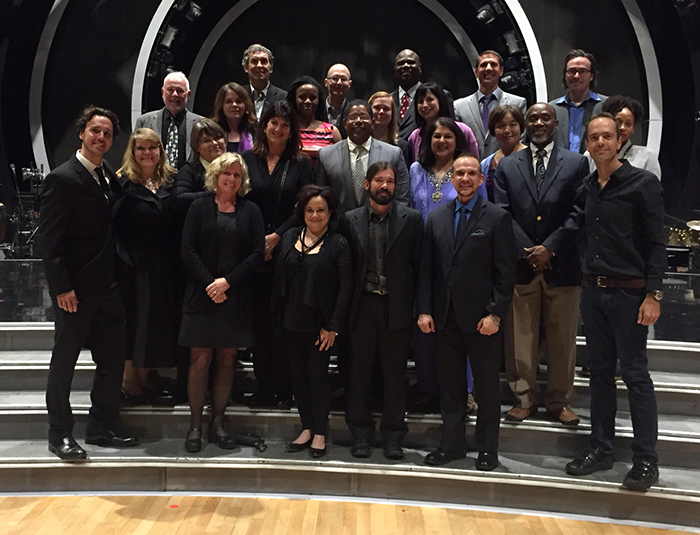 The Television Academy Faculty Seminar was not just an honor in which to participate, it also was a means to connect with research and internship opportunities for Elizabethtown College students and to learn about the product that is TV.
The Television Academy Faculty Seminar was not just an honor in which to participate, it also was a means to connect with research and internship opportunities for Elizabethtown College students and to learn about the product that is TV.
Bryan Greenberg, associate professor of marketing, was one of just 20 professors from colleges and universities across the United States invited to “Connecting the Classroom with the Television Industry,” a faculty seminar held Nov. 9 through 13 in Los Angeles, California. As a participant, his travel and lodging were paid by the Television Academy Foundation.
For a week, Greenberg was immersed in the entertainment industry, learning from top professionals in a variety of concentrations. He saw the production and choreography of the cameras for Dancing with the Stars; he met with panels of directors including those working on The Flash and The Voice; and there were site visits to Warner Bros. and Dream Works, where he talked with animators, who, he said, have advanced immensely in their technology.
The Seminar explored similarities and differences when working in different genres; the development of sources, ideas and network pitching; program scheduling, cancellation and promotion; and digital entertainment and new media. “It was one of the most amazing experiences of my life to see the technical magic behind the scenes,” he said
“I was shocked that I got accepted,” Greenberg said of the application process. Most of the professors, he said, were from media-related disciplines with communications-based Ph.Ds.—media production, communications. As the only business professor, this made him rather non-traditional among the group. “I might be the first business professor ever to attend,” Greenberg said.
His acceptance might have hinged on his teaching of advertising and media business, he said. In those classes, he spends a lot of time discussing the intersection of marketing and media. In addition, he’s developing an entertainment marketing course at E-town—something he’s wanted to offer for years. “I hope that (the Television Academy Seminar) could help me flesh that out and get something scheduled in the next year or so,” Greenberg said.
Overall, Greenberg said, he came back energized.
“It was a reminder that the world is open to our students,” he said. “Tied to that is a reminder of the incredible role and responsibility we have to change the trajectory of these young lives. … There are so many opportunities if the students take interest.
“Our students can do anything! I’m protective of that—the responsibility and value. The world is open to them. This was a reminder and proof.”
Though his grad work was in mass communications and his master’s was in media management, Greenberg’s background as a professor is firmly in business. Even so, his participation in the seminar fit. “TV networks are not in the business of making content,” Greenberg pointed out. “They are in the business of advertising and producing shows that bring eyeballs to their ads.”
There was a lot of discussion about the move toward new ways of distributing television programming, Greenberg said. YouTube, Netflix, Amazon, HBO, streaming services. It’s not just NBC, CBS and ABC any more. “TV can now target their audience. People can now be more selective on what they watch and read. It’s self-select.
The students, he said, need to understand that TV is an industry that utilizes marketing. “This is relevant to ALL students. This is a product, a service that excites them. One they are familiar with.
“They’re entering a world so different from the one we came from,” he said, noting that he sees his participation in this program as a way of filling in some gaps so he can better prepare his students, as professionals and in their own consumption of media and information.
All that said, Greenberg said he is honored by the support and resources from the College and from Fletcher McClellan, dean of faculty, and Sylvester Williams, Department of Business. “They embrace the ideas of being non-traditional in the professional interests we have,” he said. “That’s another thing that makes (Elizabethtown College) special.”

